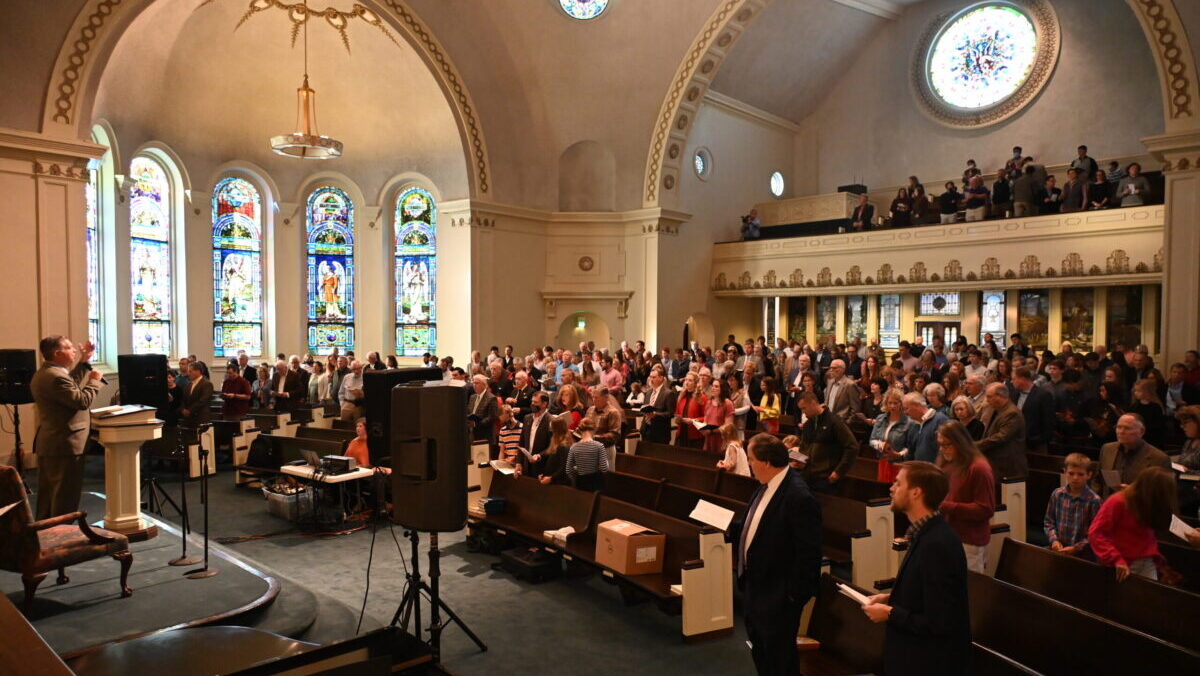EDITOR’S NOTE — As we approach this year’s Southern Baptist Convention Annual Meeting in New Orleans (June 13–14), The Baptist Paper has compiled comments from both of this year’s SBC presidential candidates. Right now, there are two candidates who have announced their intentions to be nominated for SBC president — incumbent Bart Barber and Georgia pastor Mike Stone. See more on both candidates below.
Bart Barber
Bart Barber, current president of the Southern Baptist Convention, tweeted May 3 that he would be unable to participate this year in panel discussions, Q&As and podcasts leading up to the SBC Annual Meeting. In order to provide fair coverage of both known presidential candidates, The Baptist Paper reviewed social media and previous interviews to compile a few of Barber’s responses to some of the pressing issues facing the SBC.
“One of the reasons I was reluctant to be president of the SBC was because I wanted to keep loving the SBC,” Barber told The Baptist Paper last year. “I was worried that the political intrigue — or whatever else — would be something that would make me say ‘Gosh, this is so messy and difficult.’
“This has been the opposite. I’m so much more in love with who we are as Southern Baptists.”
While Barber has described being SBC president as an honor, he also has found himself in the middle of a variety of pressing issues facing the Convention:
Response to sexual abuse
In an interview on “60 Minutes” last October, host Anderson Cooper asked Barber about reports that victims of sexual abuse had been ignored by SBC leaders when reporting abuse. “That’s not a strong enough word,” Barber replied. “We didn’t just ignore them. Sometimes we impugned their motives. Sometimes we attacked them. The reason why I’m president of the Southern Baptist Convention is because our churches do not agree with that and have taken action to correct those things.”

After his election, Barber appointed the Abuse Reform Implementation Task Force, an initiative approved by messengers to the annual meeting in Anaheim. The ARITF has since provided updates on its website related to reforms including a Ministry Check database and a hotline for survivors to report abuse.
In answer to a question about the cost of maintaining the hotline, Barber posted a video on Twitter in January about the financial and human cost of doing nothing about sexual abuse. “I firmly believe that anything that we can do to prevent sexual abuse in our churches, anything we can do to aid survivors and help them is money well spent and reduces our expenses in the long run.”
Saddleback Church/women in roles that have pastor in the title
Meeting in February, the SBC Executive Committee (on recommendation from the Credentials Committee) deemed Saddleback Church in Lake Forest, California, and four other churches not in friendly cooperation with the SBC due to concern over female pastors. Founded by pastor and author Rick Warren 43 years ago, Saddleback was one of the SBC’s largest churches before its removal in February.
Saddleback is among three churches planning to appeal the EC’s action in New Orleans, and messengers will vote on the appeal. See related story here. and here.
Barber has stated on multiple occasions, including in a post on his blog, his support for the SBC disfellowshipping churches with women serving as pastors.
SBC structure and cooperation
In a May 10 video on Twitter, Barber said motions likely will be made in New Orleans to ask the next SBC president to appoint a committee to review the SBC’s constitution and bylaws and suggest changes with regard to what cooperation means in the SBC. This also could lead to a review of the Baptist Faith and Message for updates or clarifications.
“I’m supportive of the idea of having a task force and reviewing these things, particularly when it comes to the structure of our governing documents and the meaning of cooperation,” Barber said.
Barber also expressed support for allowing messengers to vote on an amendment initially proposed last year that would add wording to the constitution disqualifying from friendly cooperation a church that affirms, appoints or employs a woman as a pastor of any kind.
Mike Stone
For Georgia pastor Mike Stone, his willingness to be nominated as Southern Baptist Convention president comes down to three key issues — evangelism, sexual abuse reform and the “unsustainable” economic trajectory of the SBC Executive Committee.
Stone, pastor of Emanuel Baptist Church in Blackshear and a former chair of the SBC Executive Committee, announced April 26 his intentions to challenge Barber.
Evangelism
Stone is quick to point out his desire to lead an evangelism initiative that he’s calling Crossover America. And he is pointing to the Annual Church Profile report that Lifeway Christian Resources released May 9 as exhibit A of the need for a nationwide evangelism focus.

“In the last year, we’ve lost 450,000 members, and we’ve lost over 400 churches that used to be in cooperation with us,” he noted May 12 in an hour-long Twitter Spaces interview with Tom Buck, pastor of First Baptist Church Lindale, Texas.
“All of those things should be of grave concern.”
Sexual abuse
Stone expressed that he believes the SBC is headed in a “wrong trajectory on dealing with the sex abuse issue.”
In an earlier released video announcing his decision to pursue the SBC presidency, Stone noted “we need leaders who will guide us to care well for victims while at the same time embracing scriptural principles of due process and the handling and publishing of accusations.”
While Stone believes a database of those who have been convicted or have admitted guilt of sexual abuse would be helpful, he said a database of those “credibly accused” would leave the door open for more issues since he believes there is a lack of clarity on what “credibly accused” means.
Stone has also voiced concerns over the Executive Committee’s partnership with Guidepost Solutions and that organization’s affirmation of the LGBTQ+ lifestyle. Guidepost led an independent investigation alleging the EC mishandled reports of sexual abuse. While the EC in recent months has signaled it is moving away from partnering with Guidepost, Stone said he has concerns with third-party groups in general.
“We don’t need an outside firm to spend millions of dollars to spend ourselves into an unsustainable financial path,” he said.
In his video announcing plans to be nominated, Stone noted that when abuse happens in local churches, the SBC needs to “resource local autonomous congregations to deal with these matters biblically, legally and compassionately.”
Financial trajectory
Stone addressed reports of the SBC Executive Committee’s current financial trajectory being declared by EC auditors as “unsustainable.”
Stone said he agrees with Barber that “the cost of doing nothing is greater than the cost of doing something,” but he also emphasized the importance of making wise decisions. “I would say the cost of doing something unwise and unbiblical is apparently unsustainable,” he said. “I personally don’t know any single leader … who is advocating doing nothing.”
Women pastors
Stone also is expressing support for the amendment to the SBC’s constitution related to the issue of women serving as pastors. If brought to the floor and approved by messengers, this amendment would declare churches with women pastors to be out of fellowship with the SBC.
While Stone noted there appears to be a need for more clarity on this particular issue, he expressed concerns it could lead to “muddying the water further by talking about some wholesale systemic review of all the governing documents” of the SBC.
Stone noted that if elected he’d respect and follow through with appointing a task force if directed by messengers, but he believes the move would be unnecessary.
Amid issues of evangelism, sexual abuse reform and an “unsustainable” financial trajectory, he said, “in South Georgia we’d say we’ve got a lot bigger fish to fry right now.”
EDITOR’S NOTE — This story was written and compiled by The Baptist Paper, with reporting from Meredith Flynn and Shawn Hendricks.








